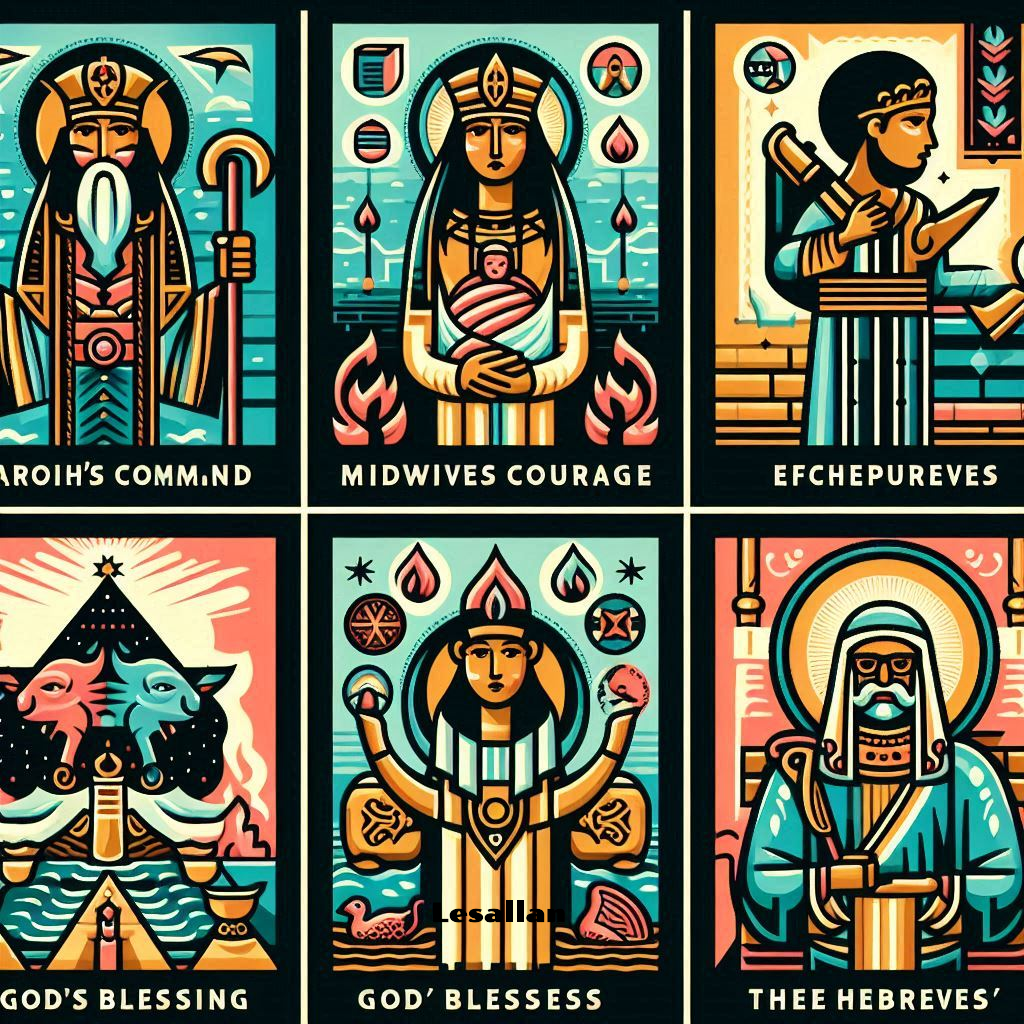Lesallan – August 31, 2024

Exodus 1:15-22 (ESV): Detailed Analysis
Version: ESV
Initial Observations & Questions
The passage I want to remember discusses a pivotal event in the book of Exodus. It talks about how the king of Egypt orders the Hebrew midwives, named Shiphrah and Puah, to carry out the killing of all male Hebrew babies as soon as they are born. This act is part of the broader context of the oppression and enslavement of the Hebrew people by the Egyptians. The bravery and defiance of Shiphrah and Puah in refusing to carry out this command is a testament to their courage and moral integrity. This pivotal moment sets the stage for the eventual emergence of Moses as a leader and liberator of the Hebrews.
Why did the king of Egypt specifically target male infants?
The midwives feared God and did not follow the king’s command, showing incredible bravery and dedication to their beliefs. Despite the potential consequences, they prioritized their moral compass and stood up for what they knew was right. Their unwavering commitment to their values is an inspiring example of integrity and courage, even in the face of daunting challenges.
What does it mean to “fear God” in this context?
The midwives made it clear to Pharaoh that Hebrew women possessed great skill in childbirth, often delivering their babies before the midwives could even arrive to assist. This skill and efficiency of the Hebrew women in childbirth impressed the midwives and made their assistance not always necessary.
How did this explanation affect Pharaoh’s subsequent actions?
What does the midwives’ defiance reveal about their character and faith?
Structure
This passage (Exodus 1:15-22, ESV) is a significant part of the broader narrative detailing the harsh oppression and subjugation of the Israelites in Egypt. The text below is a dynamic recount of the events that paved the way for the Israelites’ ultimate freedom, a powerful saga led by the iconic figure, Moses. The passage itself can be divided into two main sections, each highlighting different aspects of the hardships faced by the Israelites and the resilience they displayed in the face of adversity. This narrative serves as a crucial foundation for understanding the challenges and triumphs that characterized the Israelites’ journey to freedom and fulfilling their destiny.
Pharaoh’s command to the midwives (Exodus 15-16, ESV)
The king’s decree (verse 15)
The specific command to kill male infants (verse 16)
The midwives’ response and God’s blessing (Exodus 17-22, ESV)
The midwives’ fear of God and disobedience to Pharaoh (verses 17-19)
God’s blessing upon the midwives (verses 20-21)
Pharaoh’s reaction and subsequent command (verse 22)
Words & Phrases
“Feared God” (Exodus 1:17, 21, ESV)
What does it mean to fear God in this context?
In this context, fearing God implies a deep reverence and respect for God’s authority and commandments, which overrides the fear of earthly rulers. This fear is not about being scared of God’s punishment, but rather a profound sense of awe and love for God. It involves living a life that reflects this reverence, seeking to honor God in all thoughts and actions. This fear of God motivates one to uphold moral and ethical standards, knowing that the ultimate accountability is to God rather than human authorities. It is a fear that inspires obedience and humility, guiding individuals to make decisions guided by faith and righteousness, rather than fear of human judgment.
“Vigorous” (Exodus 1:19, ESV)
What does the term “vigorous” imply about the Hebrew women?
The term “vigorous” suggests that the Hebrew women were not only physically strong and healthy, but also possessed a remarkable resilience. It implies that they were capable of enduring the challenges of childbirth with fortitude and determination. This strength could have also been indicative of their mental and emotional robustness, enabling them to approach the birthing process with confidence and a positive mindset. Overall, the term “vigorous” paints a picture of the remarkable capabilities and endurance of the Hebrew women during childbirth.
“Oppress/Oppressed” (Exodus 1:11, 12-13, ESV)
How did the Egyptians oppress the Israelites?
The Egyptians subjected the Israelites to cruel oppression, forcing them into harsh labor and making their lives bitter with arduous tasks in brick-and-mortar construction as well as various forms of toil in the fields. The Israelites endured ruthless treatment at the hands of the Egyptians, who sought to break their spirit and subjugate them through relentless and grueling work.
“Ruthlessly” (Exodus 1:13-14, ESV)
What does the term “ruthlessly” indicate about the Egyptians’ treatment of the Israelites?
The term “ruthlessly” indicates that the Egyptians were not only extremely harsh and cruel in their treatment of the Israelites but also showed no mercy or compassion. This word conveys the relentless and unforgiving nature of the oppression and suffering inflicted upon the Israelite community. It paints a picture of unyielding and brutal behavior, highlighting the severity and uncompromising attitude of the Egyptians towards the Israelites.
“Blessed” (Exodus 1:20-21, ESV)
What does it mean that God “blessed” the midwives?
In various interpretations, God’s blessing is thought to encompass both material and spiritual prosperity. This can be seen in the growth and prosperity of their families and in the divine favor that they received. The blessings from God are often perceived as encompassing all aspects of life, bringing about not only tangible wealth but also emotional and spiritual well-being.
Summary, correlation, & application
The main point of this passage (Exodus 1:15-22, ESV) is the faithfulness of the Hebrew midwives, who feared God and chose to disobey Pharaoh’s command, resulting in God’s blessing upon them.
In Exodus 1:15-22 (ESV), we witness the admirable courage and faithfulness of the Hebrew midwives. Despite the Pharaoh’s command to kill all Hebrew male babies, these midwives chose to fear God and defy the order. Their obedience to God rather than earthly authority resulted in God blessing them. Their example is a powerful testament to the strength of faith and the rewards of honoring God’s will.
In this passage, we see a clear parallel with other parts of Scripture that underscore the significance of revering God and following His commandments, despite the directives of earthly authorities. For example, in Daniel 3:16-18 (ESV), Shadrach, Meshach, and Abednego fearlessly chose to obey God rather than King Nebuchadnezzar’s command to worship a golden image. Similarly, in Acts 5:29 (ESV), the apostles declared their allegiance to God when they proclaimed, ‘We must obey God rather than men’ (ESV). These examples remind us of the unwavering commitment to God’s truth and righteousness that we are called to uphold, even when it conflicts with human authority.
Interpreted within its canonical context, this passage teaches the timeless importance of standing firm in one’s faith and values, even when faced with oppressive and unjust demands. This principle resonates across cultures and throughout history, serving as a guiding light in navigating ethical dilemmas and societal challenges. In today’s world, it can be applied to pressing issues such as advocating for human rights, speaking out against systemic injustices, and standing against discriminatory laws or practices in society. By embodying this steadfastness in our beliefs and actions, we contribute to the ongoing pursuit of a more just and equitable world for all.
Further questions
How does the fear of God influence ethical decision-making in contemporary contexts?
What are some modern examples of individuals or groups who have stood up against oppressive regimes or practices due to their faith or moral convictions?
How does the concept of divine blessing manifest in the lives of those who choose to obey God over earthly authorities?



7 Comments
TinyURL · September 1, 2024 at 1:34 pm
Hi, I’m Jack. Your website has become my go-to destination for expert advice and knowledge. Keep up the fantastic work!
TinyURL · September 1, 2024 at 4:42 pm
Hello, Jack speaking. I’ve bookmarked your site and make it a habit to check in daily. The information is top-notch, and I appreciate your efforts.
igameplay · September 11, 2024 at 12:53 pm
I just could not depart your web site prior to suggesting that I really loved the usual info an individual supply in your visitors Is gonna be back regularly to check up on new posts
igameplay · September 11, 2024 at 1:08 pm
you are in reality a good webmaster The website loading velocity is amazing It sort of feels that youre doing any distinctive trick Also The contents are masterwork you have done a fantastic job in this topic
bizzlyn · September 12, 2024 at 10:43 am
Attractive section of content I just stumbled upon your blog and in accession capital to assert that I get actually enjoyed account your blog posts Anyway I will be subscribing to your augment and even I achievement you access consistently fast
largehints · September 12, 2024 at 12:51 pm
Wow superb blog layout How long have you been blogging for you make blogging look easy The overall look of your site is magnificent as well as the content
Moral Courage and Divine Blessing in Exodus 1:15-22 (ESV) – A Journey In Life · September 3, 2024 at 6:03 pm
[…] Thechristianthing.com. https://thechristianthing.com/exodus-115-22-esv-detailed-analysis/ […]
Comments are closed.